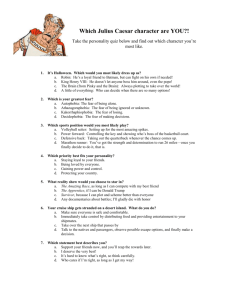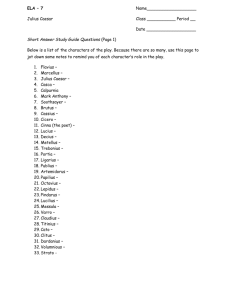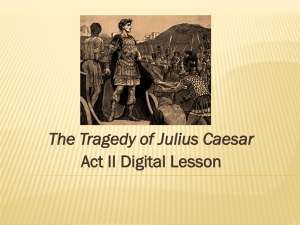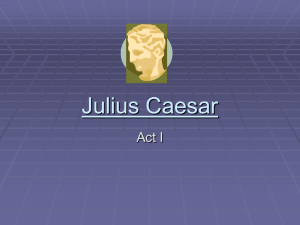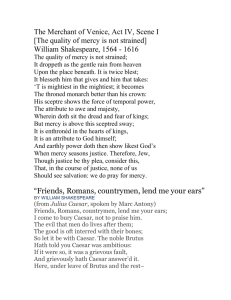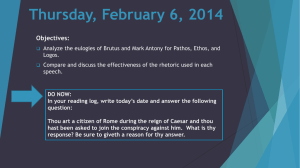Julius Caesar | Act I, Scene 2: Summary and Analysis
advertisement
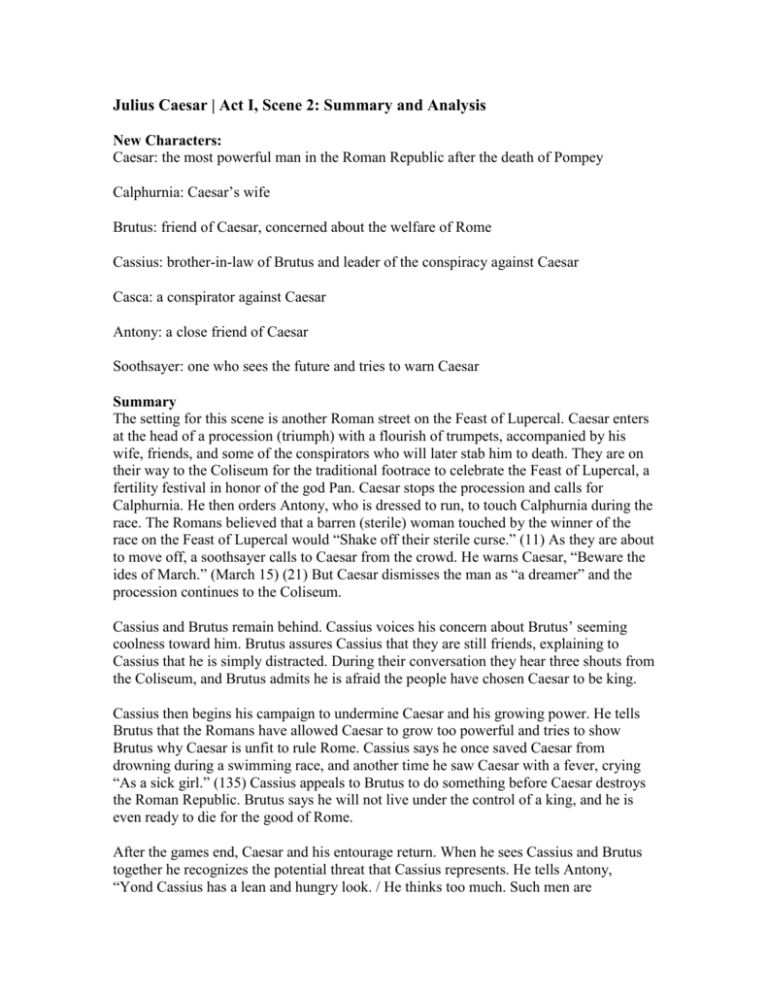
Julius Caesar | Act I, Scene 2: Summary and Analysis New Characters: Caesar: the most powerful man in the Roman Republic after the death of Pompey Calphurnia: Caesar’s wife Brutus: friend of Caesar, concerned about the welfare of Rome Cassius: brother-in-law of Brutus and leader of the conspiracy against Caesar Casca: a conspirator against Caesar Antony: a close friend of Caesar Soothsayer: one who sees the future and tries to warn Caesar Summary The setting for this scene is another Roman street on the Feast of Lupercal. Caesar enters at the head of a procession (triumph) with a flourish of trumpets, accompanied by his wife, friends, and some of the conspirators who will later stab him to death. They are on their way to the Coliseum for the traditional footrace to celebrate the Feast of Lupercal, a fertility festival in honor of the god Pan. Caesar stops the procession and calls for Calphurnia. He then orders Antony, who is dressed to run, to touch Calphurnia during the race. The Romans believed that a barren (sterile) woman touched by the winner of the race on the Feast of Lupercal would “Shake off their sterile curse.” (11) As they are about to move off, a soothsayer calls to Caesar from the crowd. He warns Caesar, “Beware the ides of March.” (March 15) (21) But Caesar dismisses the man as “a dreamer” and the procession continues to the Coliseum. Cassius and Brutus remain behind. Cassius voices his concern about Brutus’ seeming coolness toward him. Brutus assures Cassius that they are still friends, explaining to Cassius that he is simply distracted. During their conversation they hear three shouts from the Coliseum, and Brutus admits he is afraid the people have chosen Caesar to be king. Cassius then begins his campaign to undermine Caesar and his growing power. He tells Brutus that the Romans have allowed Caesar to grow too powerful and tries to show Brutus why Caesar is unfit to rule Rome. Cassius says he once saved Caesar from drowning during a swimming race, and another time he saw Caesar with a fever, crying “As a sick girl.” (135) Cassius appeals to Brutus to do something before Caesar destroys the Roman Republic. Brutus says he will not live under the control of a king, and he is even ready to die for the good of Rome. After the games end, Caesar and his entourage return. When he sees Cassius and Brutus together he recognizes the potential threat that Cassius represents. He tells Antony, “Yond Cassius has a lean and hungry look. / He thinks too much. Such men are dangerous.” (204–205) He says that Cassius is never at “heart’s ease” when he is in the company of someone who is better than he (Caesar). But Caesar quickly dismisses the threat posed by Cassius “for always I am Caesar.” (222) Casca, cynical and sarcastic, describes to Brutus and Cassius what happened at the Coliseum. The crowd cheered when Antony presented Caesar with a crown three times, which Caesar refused each time. According to Casca’s account, the people cheered so much that their bad breath knocked Caesar down and he passed out. Brutus, however, says that Caesar has epilepsy. Before he fell, Casca says, Caesar told the crowd that they could cut his throat if he displeased them, and Casca says he would have done it if he had a knife. When he recovered from his seizure, Caesar apologized for his words and actions, winning the forgiveness and sympathies of the crowd. Casca also tells Cassius and Brutus that Flavius and Marullus “for pulling scarves off Caesar’s images, are put to silence.” (296–7) This might mean they were put out of office, imprisoned, or even put to death. Cassius recognizes Casca as another potential ally against Caesar and invites him to supper. He tells Brutus to consider all the things they have discussed. When Cassius is alone he says in a soliloquy (a speech made by a character who is alone on the stage) that he will write letters in different handwriting and leave them where Brutus will find them. He hopes the letters will convince Brutus that public opinion is opposed to Caesar, and move Brutus to take action. Analysis This scene shows Caesar’s power and the attitudes of those surrounding him. This is done through Caesar’s words in the opening lines, the reactions of others to him, and what others say about him. Caesar is vain, insensitive, and conceited. He humiliates his wife by publicly calling attention to her sterility. Yet Antony jumps when Caesar gives him an order. Antony responds, “When Caesar says ‘Do this,’ it is performed.” (13) Caesar seems to be afraid of nothing. He dismisses the soothsayer as a “dreamer.” This inflated opinion of himself will resurface later in the scene and several other times in the play. The scene reveals that Brutus is troubled by Caesar’s rise to power. This concern has preoccupied him to the point that he has neglected his friends. Brutus is at war with himself. If there is a villain in the play, it is Cassius. He is jealous of Caesar and aware that Brutus can be manipulated by what he perceives to be for the good of Rome. Cassius probes Brutus by asking if he is aware of what is happening in Rome. When Brutus reacts to the shouts from the crowd, Cassius steps up his attack on Caesar. His story about saving Caesar’s life may or may not be true. Angrily he points out that Caesar has become a god and that he must bow to him. The issue of subjective interpretation is significant in this scene. Although Brutus is already considering the potential threat Caesar poses to Rome, it is Cassius’ perception of Caesar that adds to Brutus’ concern. Is Caesar really as great a threat as Cassius says? When Caesar reappears, his astute political judgment is revealed when he immediately recognizes the threat that Cassius poses. He assesses Cassius as a loner who doesn’t sleep, who reads, and who is generally not content with his life. Caesar knows instinctively that if any man is to be feared, it is Cassius. Yet Caesar is afraid of nothing. This pride, coupled with ambition, blinds him and makes him vulnerable. Caesar wishes to be a god, but, ironically, he suffers from certain physical afflictions. He is deaf in his left ear, and he is an epileptic. The cynical and sarcastic Casca gives a humorous and biased account of the events that occurred at the Coliseum, revealing his own feelings toward Caesar. Caesar played to the crowd by three times refusing Antony’s offer of a coronet, a small crown. Caesar may have done this because the crown offered by Antony was only symbolic, and had no power connected with it. By refusing the crown, Caesar would show the crowd that he wasn’t really ambitious. According to Casca, when the crowd cheered, their bad breath knocked Caesar down. In actuality Caesar suffered an epileptic seizure. Brutus calls it “the falling sickness.” Cassius makes a pun, indicating that Rome has “the falling sickness,” falling down in worship before Caesar. Casca’s attitude, his account of the events and his reference to cutting Caesar’s throat, indicate to that he is another candidate for the growing plot against Caesar. Cassius invites Casca to supper to recruit him into the conspiracy. Casca’s news that Flavius and Marullus were silenced is another indication of Caesar’s possible abuse of power. Cassius’ soliloquy is an important aspect of this scene. A soliloquy, a speech made by a character who is alone on the stage, reveals the character’s true nature, thoughts, and feelings. In his soliloquy, after Casca and Brutus exit, Cassius indicates how he plans to trick Brutus into the plot against Caesar. He will forge letters indicating that Rome wants Caesar killed, and leave them where Brutus will find them. Cassius is shrewd, calculating, and ready to take advantage of Brutus for his own political and personal reasons. He knows that Brutus is well-respected in Rome, and his joining the conspiracy will give it respectability.

